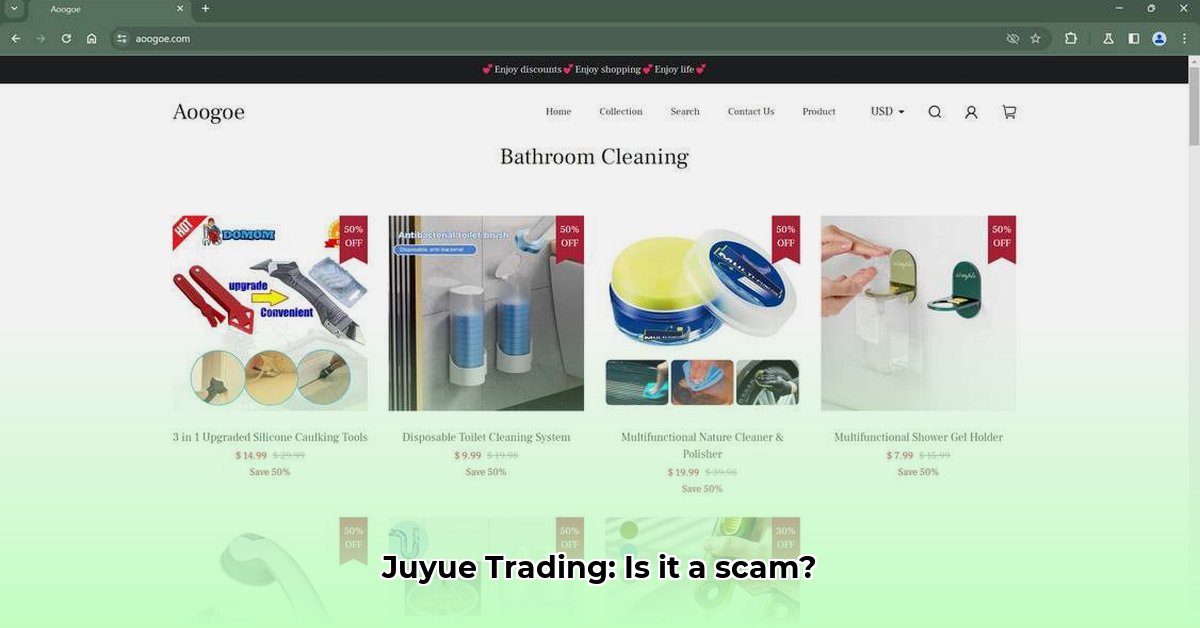
Juyue Trading England: Dodging the Online Shopping Scammers
Juyue Trading, a UK company established in early 2023, has unfortunately become the target of a sophisticated online retail fraud scheme. Numerous fraudulent websites are using the company's name to lure unsuspecting shoppers into purchasing counterfeit or nonexistent goods. This isn't about assigning blame to Juyue Trading; they are victims of this scam as well. The key is understanding how this fraud operates to protect yourself.
The Great Online Shopping Scam: How They Get You
Cybercriminals are creating fake online stores that mimic the Juyue Trading brand. They advertise heavily discounted, high-demand products—often designer goods—on popular social media platforms like Facebook, Instagram, and TikTok. They create a sense of urgency by employing phrases like "limited stock" or "flash sale," pressuring potential victims to make quick purchases.
The result? Consumers receive either counterfeit products, nothing at all, or face significant difficulties obtaining refunds. These scams are remarkably well-executed, often employing secure payment gateways like PayPal and Apple Pay to enhance their credibility. Isn’t it alarming how easily this can happen? Statistics show that online retail fraud costs consumers billions annually.
Spotting a Fake Juyue Trading Website: Your Defense Plan
Identifying fraudulent websites requires a proactive approach. Here’s how to protect yourself:
1. Website Verification: Scrutinize the website meticulously. Look for a secure connection (HTTPS) indicated by a padlock icon in your browser’s address bar. Investigate the “About Us” section for detailed company information, including a physical address and contact details. Vague or missing information is a major red flag. Do you see a physical address easily? Legitimate businesses are transparent.
2. Review Scrutiny: Don't rely on a single review site. Cross-reference reviews across multiple platforms. Look beyond positive reviews; focus on any negative feedback regarding delivery problems, product quality, or refund difficulties. Are there patterns of complaints?
3. Price Comparison: Is the pricing drastically lower than established retailers for similar products? If a deal seems too good to be true, it likely is. Prices significantly below market value are a telltale sign of a scam.
4. Report Suspicious Activity: If you suspect a website is fraudulent, report it to the platform where you encountered the advertisement (e.g., Facebook, Instagram) and relevant authorities. Reporting these scams is crucial for disrupting their operation.
5. Secure Payment Methods: While reputable payment gateways offer some buyer protection, always be cautious. If a website requests unusual payment methods outside of standard secure gateways, this should raise a serious red flag.
How to Identify Fake Juyue Trading Online Stores
The Rise of the Lookalike Site
Many consumers are encountering incredibly cheap Juyue Trading products online; these are often associated with fraudulent websites. A network of fake online stores is using the Juyue Trading name to target customers. These aren't legitimate sales; they're sophisticated scams designed to steal your money.
How to Identify Fake Juyue Trading Online Stores: A Step-by-Step Guide
This detailed guide provides actionable steps to identify and avoid fraudulent websites.
1. Website Verification:
- URL Check: Examine the website address for inconsistencies or unusual characters that might indicate a fraudulent site.
- HTTPS Verification: Ensure the website uses a secure connection (HTTPS), indicated by a padlock symbol in the browser's address bar.
- “About Us” Page Analysis: Review the “About Us” section for comprehensive company information, including a physical address and multiple contact options.
2. Comprehensive Investigation:
- Cross-Reference Reviews: Check reviews across multiple review platforms and look for consistent patterns of negative feedback.
- Price Comparison: Compare prices across other reputable retailers. Significant price discrepancies should raise immediate suspicion.
- Contact Information: Verify the availability of multiple contact methods, such as phone numbers, email addresses, and a physical address.
3. Social Media Ad Awareness:
- Be highly skeptical of social media advertisements offering unrealistically low prices or limited-time offers. Such promotions are often used by scammers to pressure potential victims into quick purchases.
4. Secure Payment Method Selection:
- Always utilize trusted payment gateways like PayPal or credit card companies that provide buyer protection for fraudulent transactions.
Key Takeaways:
- Many fraudulent websites utilize the Juyue Trading name to sell counterfeit or nonexistent goods.
- These scams leverage deceptive advertising strategies on social media platforms.
- Victims often experience non-delivery of products, unresponsive customer service, and significant difficulties in obtaining refunds.
- Consumers must exercise caution and implement proactive measures to mitigate risks. The FTC reports a significant increase in online retail fraud cases.
What to Do if You Suspect a Scam
If you encounter a suspicious website, report it immediately to the appropriate authorities (your credit card company, the FTC in the US, or other relevant agencies in your country) and to the social media platform where the advertisement was observed. Acting quickly is crucial in helping to prevent future victims.